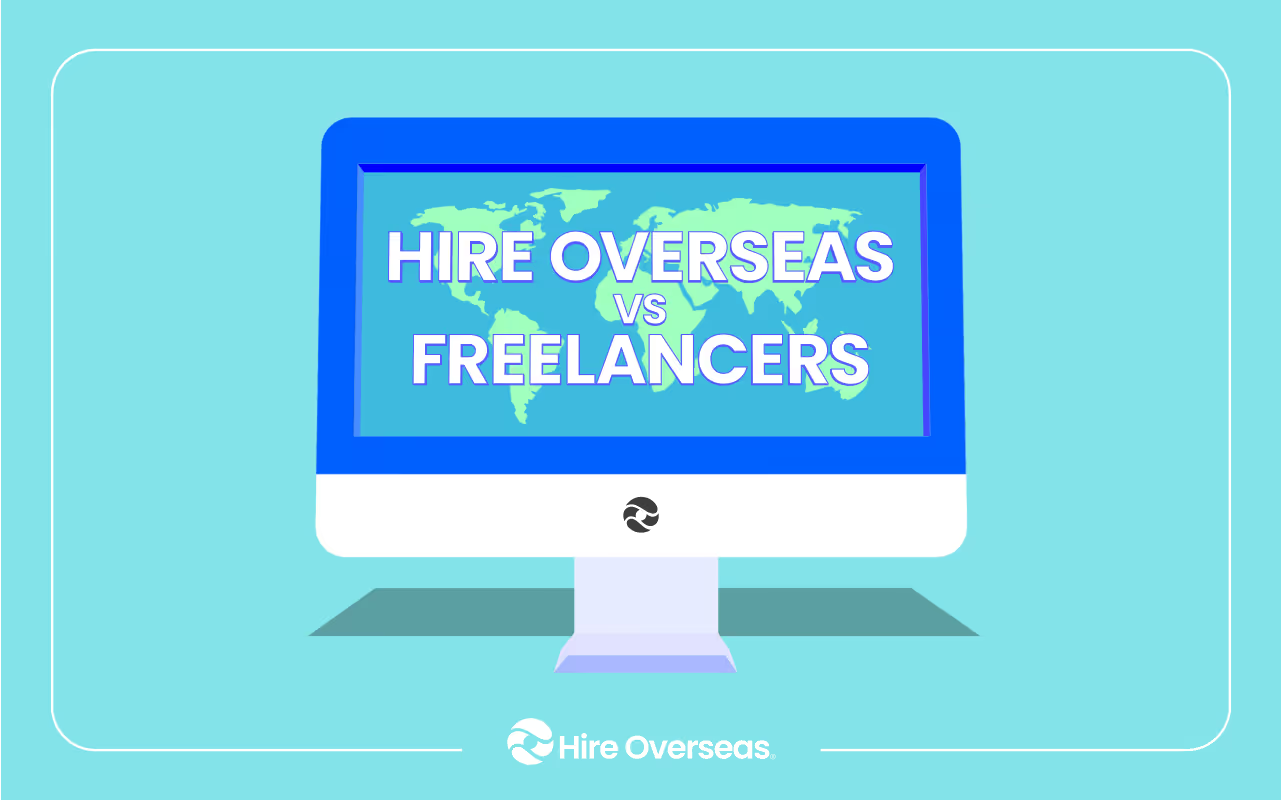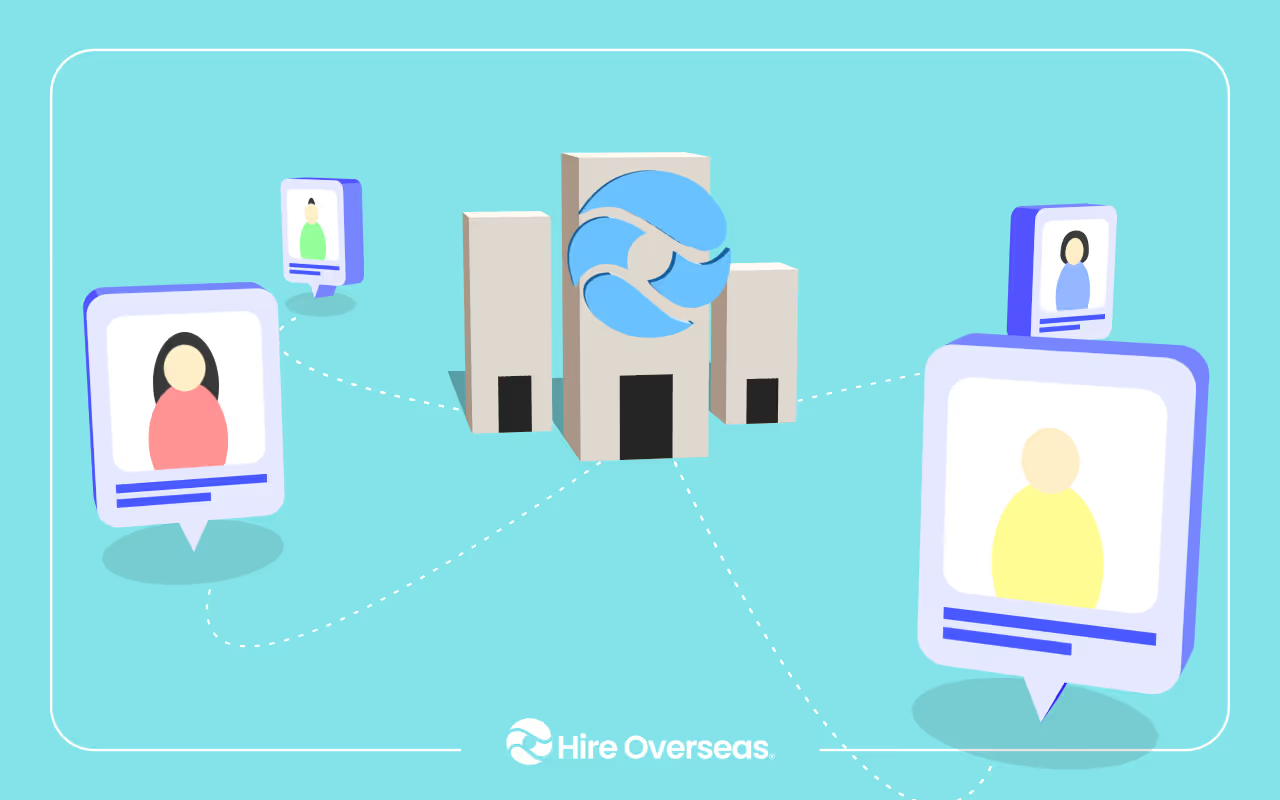Outsourcing vs Offshoring: What’s the Real Difference?
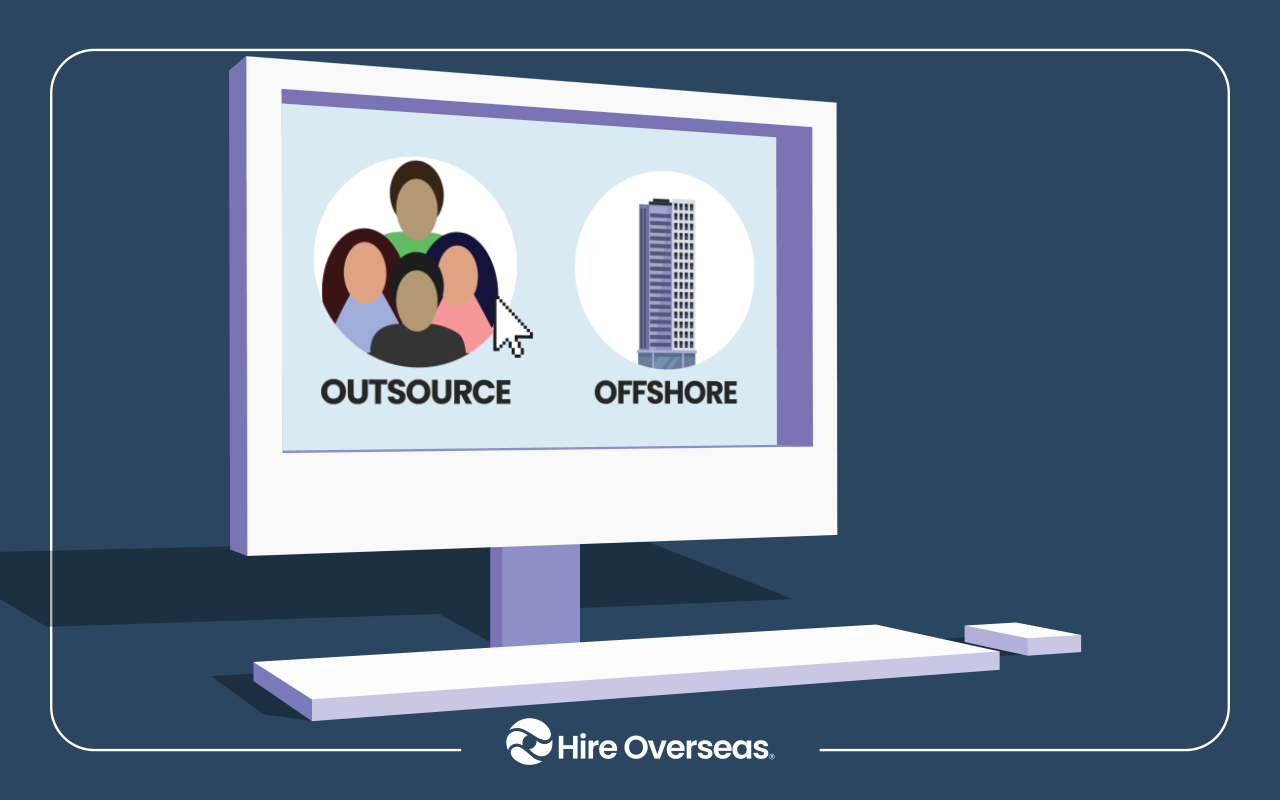
Companies are constantly exploring ways to reduce costs, tap into specialized talent, and scale efficiently. Two popular strategies often discussed in this context are outsourcing and offshoring. Although these terms are frequently used interchangeably, they have distinct meanings and strategic implications. Let’s break down what each approach involves, highlight their differences, and help you decide which strategy aligns best with your business goals.
What is Outsourcing?
Outsourcing is the practice of delegating specific business processes or services to an external provider. These providers may operate domestically or internationally, allowing businesses to tap into specialized expertise while optimizing operational costs and resources.
Businesses often partner with third-party vendors to handle functions like customer service, payroll, IT support, marketing, or outsourced accounting. By outsourcing these tasks, companies can streamline their focus on core competencies, increase operational agility, and benefit from scalable, on-demand support without investing heavily in in-house infrastructure.
What is Offshoring?
Offshoring involves relocating certain business operations to another country to take advantage of lower labor costs, greater talent availability, or strategic market access. Unlike outsourcing, offshoring typically means the business maintains direct control over the processes and integrates the overseas team into its own corporate culture and workflows.
Many companies establish their own remote teams in the Philippines, Latin America, or South Africa. They may set up offshore development centers, customer support hubs, or back-office operations abroad. This approach offers greater control, enables direct hiring, and allows companies to embed offshore teams into their organizational values and operational standards.
For example, a U.S.-based tech company might build a software engineering team in India, or a European brand might move its manufacturing to Vietnam. These strategies help reduce costs, scale operations, and access diverse, high-quality talent pools.
Key Difference Between Offshoring and Outsourcing
Many business leaders ask, "what is the difference between outsourcing and offshoring?" While both aim to improve efficiency and reduce costs, they differ significantly in structure and execution. Here’s a detailed breakdown:
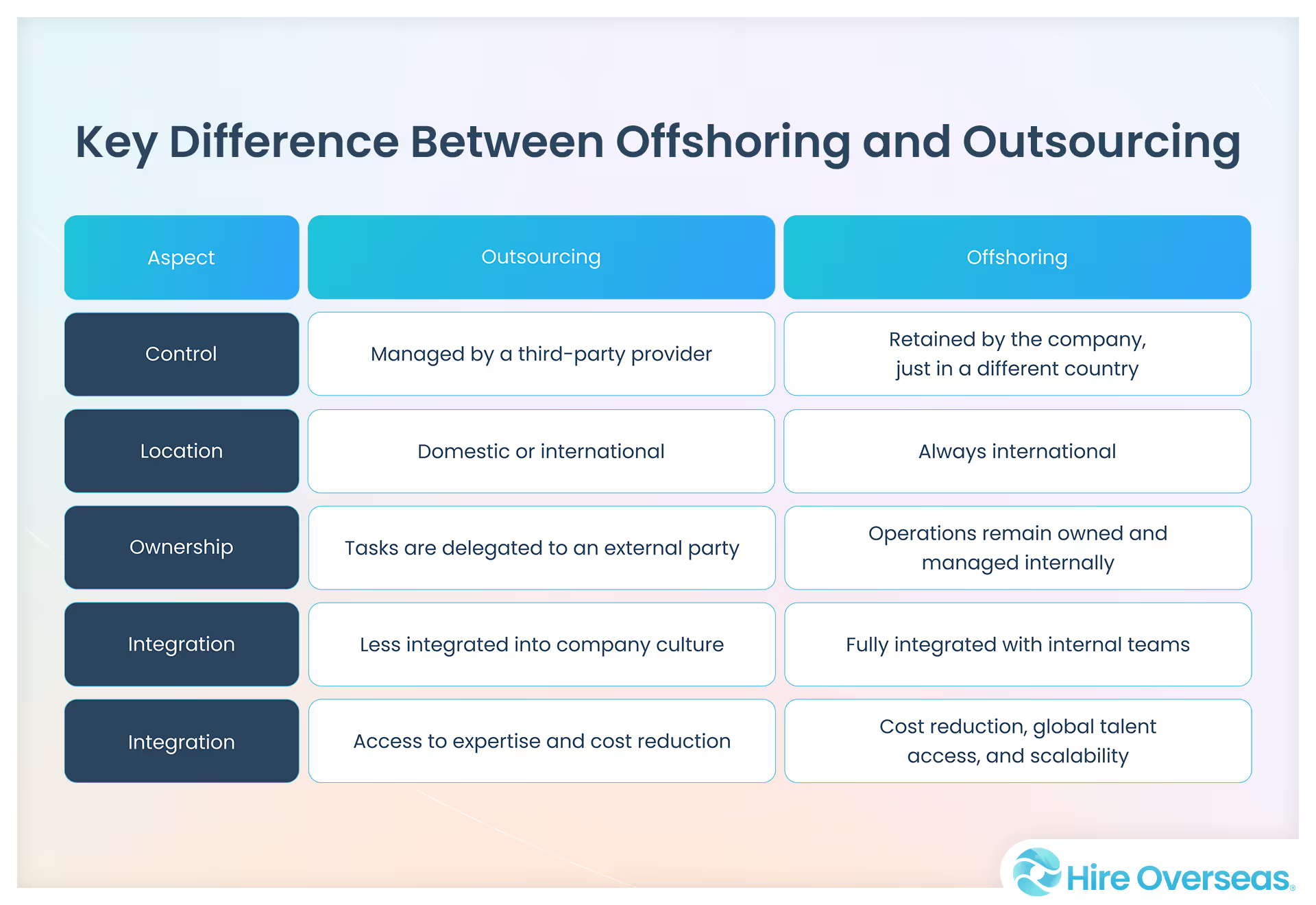
These distinctions are crucial for businesses considering global expansion, operational optimization, or ways to increase efficiency while maintaining quality and control.
Outsourcing vs Offshoring vs Nearshoring
When evaluating options, another term often surfaces: nearshoring. Nearshoring refers to relocating operations to a nearby country, often within the same region or time zone. This strategy combines some benefits of offshoring, such as cost savings, while minimizing challenges like cultural differences and communication barriers.
So, when comparing outsourcing vs offshoring vs nearshoring, each has unique pros and cons. Businesses should assess their goals, budget, and operational priorities before choosing.
Outsourcing vs Offshoring: Examples

Understanding real-world examples can make it easier to grasp the differences between outsourcing and offshoring. Here’s a breakdown of how companies typically apply each strategy in practice.
Outsourcing Examples
Outsourcing can take many forms, depending on the business needs and goals. For example, a company might hire a specialized third-party agency to manage its social media presence and digital marketing campaigns. This allows the internal team to focus on core brand strategy while experts handle content creation, posting schedules, and audience engagement.
Another common example is using an external firm for payroll processing and HR administrative tasks. Instead of maintaining a full in-house payroll department, businesses can outsource to firms that specialize in compliance, tax filing, and employee payment services. Legal services, IT support, and customer service call centers are also widely outsourced to streamline operations and cut costs.
Offshoring Examples
Offshoring typically involves establishing owned operations overseas to tap into new talent pools and reduce labor expenses. A U.S.-based tech company, for instance, might set up a dedicated software development center in Vietnam, benefiting from a highly skilled engineering workforce at a fraction of domestic costs. The company retains full control over processes and ensures seamless integration with its internal teams and culture.
Similarly, a European apparel brand might relocate its manufacturing to Bangladesh. By doing so, it can significantly lower production costs while maintaining control over quality standards and supply chain logistics.
Companies in finance and healthcare also offshore functions like data processing and back-office support to countries such as India or the Philippines to scale rapidly and serve global markets more effectively.
These offshoring vs outsourcing examples illustrate how each strategy works in practice, helping businesses decide which approach best aligns with their goals and resources.
Pros and Cons of Outsourcing
Pros
- Access to specialized expertise: Gain immediate access to skilled professionals and advanced technology without long-term investment.
- Cost savings: Reduce expenses on recruitment, training, and infrastructure.
- Scalability and flexibility: Easily scale operations up or down depending on market demand and business needs.
- Focus on core business: Free up internal resources to focus on strategic activities that drive growth and innovation.
Cons
- Reduced control: Less oversight over processes, quality, and service delivery standards.
- Potential quality issues: Differences in standards or misaligned expectations may affect output.
- Communication barriers: Time zone differences, cultural nuances, and language gaps can lead to misunderstandings.
- Security and confidentiality risks: Sharing sensitive data with external parties increases vulnerability.
Pros and Cons Offshoring
Pros
- Significant cost reduction: Lower labor and operational costs in other countries help maximize margins.
- Access to global talent pools: Tap into specialized skills and expertise not readily available locally.
- Complete operational control: Maintain full oversight and integrate offshore teams into company culture and systems.
- Suport for global expansion: Establish a presence in new markets, enhancing brand reach and customer support capabilities.
Cons
- Complex legal and compliance requirements: Navigating foreign regulations, taxes, and labor laws can be challenging.
- Management challenges: Coordinating and aligning remote teams with headquarters can strain resources.
- Cultural and time zone differences: Differences may impact team cohesion, communication, and overall productivity.
- Upfront investment and setup: Establishing offshore operations requires significant initial resources and planning.
Which Strategy is Right for You?
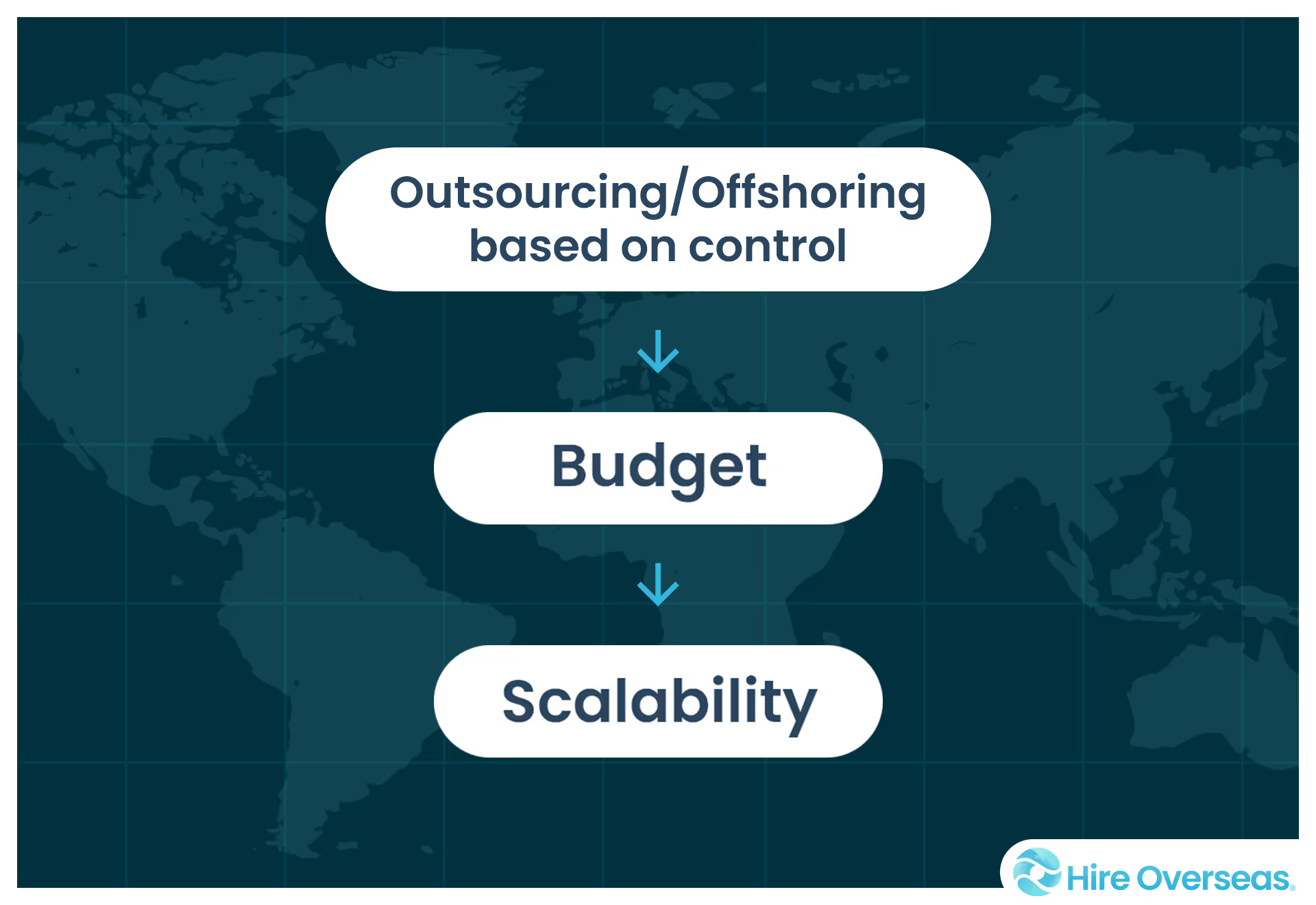
Deciding between outsourcing and offshoring comes down to your company's specific needs, goals, and resources. Each approach has its ideal use cases.
When Outsourcing Makes Sense
Outsourcing is often best suited for short-term projects, routine tasks, or low-complexity assignments that do not require deep alignment with your company's core culture. If you have fluctuating workloads, need rapid setup, or wish to delegate tasks like customer service inquiries, payroll processing, or basic IT support, outsourcing can be highly effective.
When Offshoring Makes Sense
Offshoring is ideal for ongoing roles, complex functions, or when building teams you intend to integrate deeply into your organization for the long term. If your business is committed to nurturing talent, establishing consistent quality, and integrating overseas teams into your company culture, offshoring offers substantial advantages.
Hire Overseas has successfully helped multiple US-based companies establish a loyal offshore support team in the Philippines. By directly hiring, onboarding, and training the overseas team, the company built a highly effective, dedicated workforce that fully embraced the company’s values, significantly improving customer satisfaction and operational efficiency.
Key Factors to Consider:
- Control & Quality: Offshoring provides greater control over processes, enabling consistent high-quality output, whereas outsourcing often involves relinquishing control to an external vendor.
- Budget & Goals: Evaluate if your priority is short-term cost reduction (favoring outsourcing) or long-term value and consistent quality (favoring offshoring).
- Timeframe & Scalability: Outsourcing suits temporary or project-based needs with quick deployment, while offshoring supports scalable, ongoing operational growth.
Ultimately, businesses seeking long-term, dedicated teams capable of delivering consistently high-quality results often choose offshoring. This strategic investment builds lasting value and creates competitive advantages by nurturing talent that genuinely reflects your company's culture and vision.
How Hire Overseas Helps You Offshore the Right Way
At Hire Overseas, we specialize in supporting businesses through every step of building successful offshore teams in regions like the Philippines, Latin America, and South Africa. Our deep expertise ensures that your hiring process is smooth, compliant, and fully tailored to your business needs.
Expertise in Hiring in Key Regions
Our extensive knowledge of labor markets in the Philippines, Latin America, and South Africa helps you tap into skilled, cost-effective talent pools suited to your specific industry and requirements. We handle the complexities of cross-cultural recruitment, ensuring a perfect fit for your team.
Fully Compliant Hiring & Payroll
Compliance can be challenging when hiring internationally, but Hire Overseas manages every aspect, including employment contracts, payroll administration, and legal adherence, eliminating risk and administrative burdens for your organization.
Direct-Hire Model for Maximum Control
Unlike traditional outsourcing agencies, our direct-hire model puts you in full control. Your offshore team members become fully integrated into your company culture and values, ensuring seamless collaboration and consistently high-quality outcomes.

Partner with Hire Overseas to Hire Offshore with Ease
Choosing between outsourcing and offshoring comes down to your business priorities. Outsourcing is fast, flexible, and requires less upfront effort but comes with limited control and integration. In contrast, offshoring provides significantly more control, deeper cultural integration, and long-term strategic benefits.
Ready to explore how offshoring can transform your business? Talk to the experts at Hire Overseas and discover how easy it is to build and manage your dedicated offshore team.
Book your discovery call today and start your journey toward offshore success!
FAQs about Outsourcing vs Offshoring
Is offshoring cheaper than outsourcing?
Offshoring can often be more cost-effective in the long term because you build and directly manage your own team abroad, eliminating vendor markups and gaining more control over expenses.
Can I have control over my offshore team?
Yes! With offshoring, especially through a direct hire model like Hire Overseas offers, you maintain full control over recruitment, management, processes, and quality standards.
Why should I choose offshoring over outsourcing?
If you want to build a dedicated, integrated team that feels like a true extension of your business while maintaining full control and achieving cost savings, offshoring is usually the better choice.
Unlock Global Talent with Ease
Hire Overseas streamlines your hiring process from start to finish, connecting you with top global talent.
Unlock Global Talent with Ease
Hire Overseas streamlines your hiring process from start to finish, connecting you with top global talent.

